|
|
|
Sort Order |
|
|
|
Items / Page
|
|
|
|
|
|
|
| Srl | Item |
| 1 |
ID:
167823
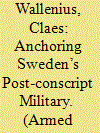

|
|
|
|
|
| Summary/Abstract |
The universal nature of conscription ties or anchors broad segments of society to the military. What happens to societal anchoring after the draft ends? Using in-depth interviews with two groups of elites, this article explores factors that promote and hinder the Swedish Military’s societal anchoring post-conscription. The first group consisted of 18 executives at the Swedish Armed Forces (SAF) headquarters with strategic positions in relation to societal anchoring. The second group consisted of 15 representatives from the corresponding political level: members of the parliamentary Committee on Defense and their officials. The interviews were semistructured and analyzed according to a grounded theory-inspired approach. Main themes concerning obstacles were the public’s low interest and dated knowledge, an unclear political debate resulting in vague expectations concerning the SAF, as well as unclear responsibility for informing the public, and confidence gaps between the military and the political elite.
|
|
|
|
|
|
|
|
|
|
|
|
|
|
|
|
| 2 |
ID:
167822
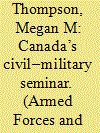

|
|
|
|
|
| Summary/Abstract |
The “civil–military gap” is a significant factor that can hinder the success of complex comprehensive approach missions. Perhaps nowhere is this gap more apparent than in the relationship between military and civilian nongovernmental organizations. Interagency education and training have been suggested as ways to diminish this divide. This research describes one Canadian approach to interagency education: the Civil–Military Seminar. Quantitative and qualitative results demonstrate the promise of both the assessment approach used and the positive outcomes that may help to narrow the civil–military gap.
|
|
|
|
|
|
|
|
|
|
|
|
|
|
|
|
| 3 |
ID:
167826
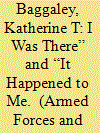

|
|
|
|
|
| Summary/Abstract |
Various theoretical frameworks have been applied in an attempt to understand the phenomenon of killing. While previous studies have examined killing as an outcome-oriented measure, few have explored killing as a narrative. Using letters written by soldiers, police officers, and security professionals found in the magazine Soldier of Fortune, this study examines the reported behaviors that occur during the killing process and argues that the process of killing is best understood as an adventure narrative. Applicability of findings to other homicides is discussed.
|
|
|
|
|
|
|
|
|
|
|
|
|
|
|
|
| 4 |
ID:
167825
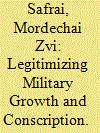

|
|
|
|
|
| Summary/Abstract |
By the 1970s, it was clear to the western world that the days of mass armies, based on broad conscription, were over. In Israel, however, despite the presence of some elements similar to those which elsewhere were leading to military contraction and a transition to all-volunteer forces, the Israel Defense Force (IDF) broadened its conscription model and embarked on massive growth. The effects of this surprising strategy are evident to this day, with Israel remaining almost the only conscription-based army in the West. Analysis of the organizational discourse and processes within the IDF in the wake of the Yom Kippur War reveals that social legitimacy is not only a prerequisite for organizational growth and boosting of enlistment but also, simultaneously, a product of the process. The organizational mechanisms used by the IDF to achieve social consent are relevant for an understanding of the processes of militarism and military buildup in our times, too.
|
|
|
|
|
|
|
|
|
|
|
|
|
|
|
|
| 5 |
ID:
167829
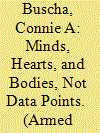

|
|
|
|
|
| Summary/Abstract |
Harris, McDonald, and Sparks’s recent quantitative research article, Sexual Harassment in the Military: Individual Experiences, Demographics, and Organizational Contexts, does not deliver its title’s promises. In 2018, social science research investigating, describing, and, ultimately, impacting human lives has advanced beyond overly simplistic figures of data points on x- and y-axes and rhetorical findings. Therefore, this response challenges numerous aspects of Harris, McDonald, and Sparks’s article. It identifies pragmatism as a valuable theoretical perspective from which to investigate the phenomenon of sexual harassment in the military. It further asserts that a qualitative methodology best provides rich, nuanced, and descriptive data from which researchers and scholars can identify measures to mitigate negative experiences for all service members regardless of gender.
|
|
|
|
|
|
|
|
|
|
|
|
|
|
|
|
| 6 |
ID:
167827


|
|
|
|
|
| Summary/Abstract |
Having read the erudite contributions of Dubik, Feaver, Kohn, Mueller, and Snider, I can only supplement our mutual inquiry through the contribution of an analysis of officer resignation from the perspective of Western political thought, particularly as embodied by strands of the civic republic tradition. I believe this tradition can give us a foundation for talking about officer resignation and a means for drawing strict boundaries around when such dissent is appropriate.
|
|
|
|
|
|
|
|
|
|
|
|
|
|
|
|
| 7 |
ID:
167824


|
|
|
|
|
| Summary/Abstract |
This study explores the issue of interpreters’ positionality as outsiders to the forces’ personnel and insiders to the local communities. Twenty local interpreters who worked in the different peacekeeping operations (PKOs) in the Bosnian War, and seven members of the forces’ personnel were surveyed on their personal and professional background, their experiences with working conditions and training as well as the particularities and challenges of PKOs. The results indicate that the status, motivations, hiring procedures, and working conditions of the interpreters changed under the different PKOs, and that this had an impact on the positionality of the interpreter. The findings suggest that specific training programs are needed to better train interpreters to work in PKOs, and that consideration should be given to the issue of how to better train peacekeeping forces to work with interpreters.
|
|
|
|
|
|
|
|
|
|
|
|
|
|
|
|
| 8 |
ID:
167828


|
|
|
|
|
| Summary/Abstract |
This essay is responding to Dr. Ionut Popescu’s review of the article “Saving Samuel Huntington and the Need for Pragmatic Civil-Military Relations.” He challenges the pragmatist outlook by questioning its usefulness to “manage relations between the military and its civilian superiors in a democracy such as the United States.” Based on the concerns of Morris Janowitz regarding military relations, three assertions are made in defense of the pragmatic approach. First, the choice between “professional versus civilian supremacy” for making crucial decisions during wartime is misleading because it is based on obsolete thinking from the twentieth-century Cold War. Second, types of wars waged are determined by complex and provisional decision-making processes amid political struggle. Third, Huntington’s civil–military theory wrongly maligns the word “politics” by distorting its meaning and purpose. Politics is a natural process and an essential feature of democracy.
|
|
|
|
|
|
|
|
|
|
|
|
|
|
|
|
| 9 |
ID:
167830


|
|
|
|
|
| Summary/Abstract |
The article “Guns and Butter: Child Mortality and the Mediators of Militarization” addresses the important subject of the social and political roles of militaries in nations above a minimum population size. Each national population is evaluated in terms of 10 characteristics including survival rates of children, level of armed conflict, economic development, political representation, and others. The authors draw a sharp distinction between social militarization and praetorian militarization. The essay is valuable in providing one dimension of the impacts of militaries on nations. However, qualitative information and analysis would greatly benefit this work. In this regard, the work of Samuel P. Huntington is instructive.
|
|
|
|
|
|
|
|
|
|
|
|
|
|
|
|
| 10 |
ID:
167821


|
|
|
|
|
| Summary/Abstract |
Regular budget cycles and annual evaluations of bureaucratic funding have created a “use-it-or-lose-it” atmosphere in agencies throughout the American government, resulting in large expenditures in the fourth quarter of the fiscal year. We show that these spending patterns apply in a least likely case: junior officers in a war zone, and that indiscriminate fourth-quarter expenditures are correlated with increases in insurgent violence. Using reconstruction data from the war in Iraq, this article shows that the tendency to overspend at the end of the fiscal year is both pervasive and detrimental to security objectives. By combining extensive interview work with econometric analysis, this article offers new insights into the politics of war, civil–military relations, and postconflict reconstruction and suggests that these pathologies may have a substantive, negative impact on a government’s ability to effectively wage counterinsurgency operations.
|
|
|
|
|
|
|
|
|
|
|
|
|
|
|
|
|
|
|
|
|